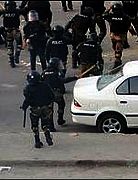“Voluntary Police” to Help Special Unit
» New Police Plan to Crackdown the Next “Sedition”
The police force of the Islamic republic of Iran is working to implement special plans for the next presidential election in June so that, in the words of its commanders, “the most secure elections in history with high public participation” will be held. Police deputy chief Radan revealed the creation of a new “voluntary police” to help the special unit of the force.
“Another Sedition is Coming”
Sedition is the term Iran’s hardline rulers use for those who questioned the official results of the controversial 2009 presidential election, out of which grew the Green Movement. The chief of police commander Ismail Ahmad Moghadam believes that March will be the preparatory field for the election because “pressure by enemies has been so high that unrest in some quarters is normal.” Despite this, the police chief claims that professional and labor unrest has declined by 30 percent in the last 11 months.
Talking about the June presidential election, he said, “This election will be the safest in history with the highest number of voters. Polls show that more than 65 percent of the electorate will vote. We have the responsibility of ensuring a safe and appropriate environment for the public.”
His deputy, commander Ahmad Reza Radan spoke in the same vein about the special unit. “The most popular personnel of the force work in this unit and I have a special liking to it as well.” He called the events of 2009 “God’s blessing” for the special unit and added, “We will be making a big mistake if we think that the 2009 sedition was a coincidence and that it is over. Because the enemy was engaged in mischief before that as well and so it is possible that we will have more seditions in future.”
He called the special police unit “the closed fist” and additional power of the force. “The specialty of this unit is that whenever other forces encounter problems in their missions, this unit will intervene to fulfill the mission successfully.”
But the most important part of Radan’s interview was the part about a “voluntary police” unit. “This voluntary police unit can be made up of people or even retirees. There are youth who desire to be with the agents working on special unit missions. They can be used them as voluntary police,” he said.
He did not elaborate more on this new idea but did say that the equipment and resources for the special unit had already been approved and that Zafar base had been launched under general Karami’s command for this purpose.
From Women to Special Mobile Units
Voluntary police is not the only new idea Iran’s police seems to be working on for its missions related to the June election. Prior to this, it had been announced that special women’s units were planned to be created who, in the words of the police chief, would get to work during a crisis. He said these women had to be “physically trained and agile.” Their mission was defined to be in reconnaissance, operations, detention, transfer and interrogation.”
Another special group is the horse mounted unit to engage in unrest.
During the last two years, various commanders of Iran’s police have publicly talked about their readiness or need to get involved in protests in favor of the regime, citing such engagement in the past. Recently, Moghadam had claimed that “many prominent individuals were destroyed because of the 2009 sedition while not a single police agent ever fled the scene.” But he added that, “Cracking on people is not the mission of the special unit. This is a people’s unit, a hezbollahi and a pro-leader unit to contain problems. The members of the unit learn to use firearms, anti-riot gear and mob control in addition to public relations.”
In another comment, Moghadam said that the “foreign exchange credit issue to purchase the force’s needed equipment to fight riots” which had been allocated by the supreme national security council but not allocated to the force, had been resolved in the years after 2009 and did not exist any longer.
Voluntary Police or Organizing Mobs and Gangsters
In the course of 2009 and 2010 crackdown of massive demonstrations in Iran, not only was the police force identifiably at the forefront of the crackdown, but it also had plain-clothes agents alongside its activities. These plainclothes agents were in fact much more violent in their attacks using lethal and police equipment. These agents were in addition to those affiliated to the Basij who also roamed the streets and attached demonstrators and they carried tags identifying them to be Basijis or Revolutionary Guard members.
In the summer of 2009 Alireza Beheshti a senior advisor to Mir-Hossein Mousavi revealed that gangsters and thugs who were officially affiliated with the police participated in the crackdown of peaceful demonstrators in those days. He announced, “We have intelligence that some individuals who had been arrested and in prison because of criminal activities were being used by the police to attack protestors and in universities.” So now it seems that Radan is trying to formalize these affiliations on the eve of a presidential election in which the bloody events of 2009 and 2010 loom large.
In the summer 2011, Ahmad Fooladizadeh, an Iranian kick boxing champion defected to Sweden and revealed that the Revolutionary Guards Corps had asked him to train their plainclothes agents. “We were sent to different provinces to train about 300 individuals in each to very high levels. Among us were experts in various martial arts fields.”


